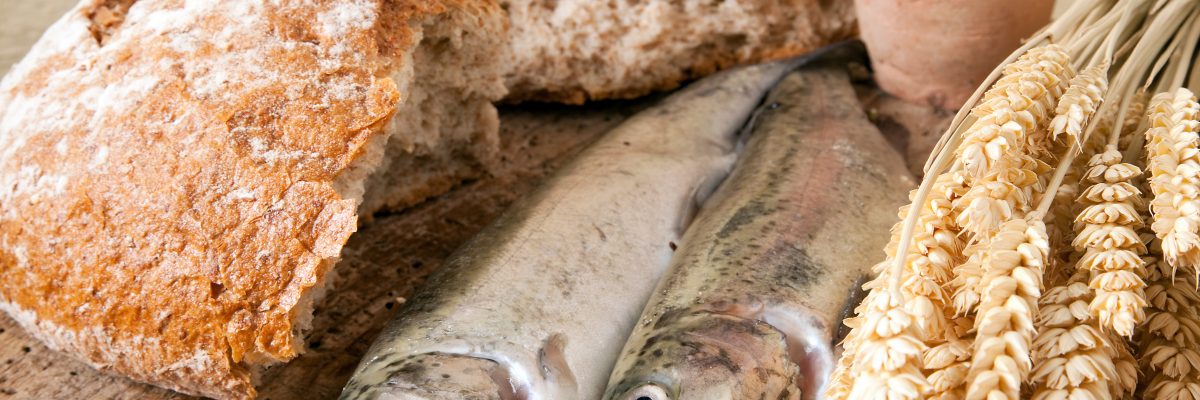
Homily for the Seventeenth Sunday in Ordinary Time, Year B
“There is a boy here who has five barley loaves and two fish;
but what good are these for so many?”-John 6:9
In every play there are principal roles and secondary ones. In the drama of human salvation, which is really the most perfect drama because it is both entertaining (which is true of any good play or show or film) and true (it actually happened in real life), there have been many apparently principal roles and many apparently secondary roles. We might ask ourselves: am I a principal player or a secondary one?
Any well-trained Christian will answer that he is a secondary player. I mean, if the one of whom Our Savior said, “No man born of woman is greater than he,” St. John the Baptist, said, “He must increase and I must decrease” (and surely the Baptist is very great indeed!), then who am I to imagine that I have anything more than a supporting role to play? I’m nothing much, after all.
Think again. Jesus, who loves us so much that he made us and continually seeks to save us, has a different perspective altogether. In his world (which is the real one, after all!), the greater must serve not just the lesser, but the least. These are his own words, which express the actual desires of his Sacred Heart. He did not become the Savior of the world in order to be the main actor on the stage of our salvation. Of course, that is true in the deepest sense, but he became Our Savior the way our father and mother became our parents: because they loved us even before we existed and did everything they did for our growth and happiness and salvation.
So in our Sunday lessons at Holy Mass we are beginning in these weeks to follow the magnificent sixth chapter of John’s Gospel. This chapter gives the heart of our religion, that is, what Our Lord intended to leave us after his ascension into heaven and before his coming again at the end of this weary world. Christ gave us himself under the appearances of bread and wine as our true worship, a real sacrifice, and our true nourishment, a mystical supper, so that we could be daily (as in “give us this day our daily bread,” ) fortified and united to him and to all those who have already reached the goal of eternal life. Because of our Eucharistic worship we are literally members of his body. As he said, “The one who feeds on me will live because of me.”
Well, then, what about these supporting roles? The divinely arranged context for the Lord’s greatest gift was his miraculous feeding of the five thousand. This event was to provide the motive of belief for his astounding assertion that he was able to give them, not just bread, but his very flesh to eat.
But who provided the original matter for this confirming miracle? A boy standing by with loaves and fishes. The Lord did not want to stage even his most personal role in this drama without the supporting role of this little kid. The miracle was worked, not out of nothing, as St. Thomas Aquinas points out in commenting on this passage, but with the materials provided by the young boy. The Savior could have done it all by himself as the creator of the universe and the redeemer of mankind, but he willed to include the humble offering of this child.
Imagine the naïve offer of a few loaves and fishes to feed five thousand (which means about thousands more, because they were counting the men only, not their wives and offspring!). Consider this the offertory for the exposition of the mystery of the Lord’s eucharistic body.
Who was this boy? We are often unaware that the liturgical tradition of the Church has a story to tell about the “minor” characters of the Gospels. For example, the seventy-two sent out by Our Lord to preach are commemorated on various days in the Roman Martyrology. They ended up as bishops in far-flung places throughout the known world, supporting the apostles in the preaching of the true faith.
Local devotion in Pavia (Pa-VEE-ah) in Lombardy in Italy tells us that the boy’s name was Syrus or Sirus, Siro in Italian. He was the first bishop of that city. He accompanied St. Peter in his preaching of the gospel at Rome and in Italy, and was sent to Pavia to lead the church there. His feast day, as the first bishop of Pavia, is December 9.
Each year on his feast day the bishop blesses bread in an enormous quantity made by local bakers, which is placed outside in the cathedral square for the faithful to take home with them. I was happy one year, thirty years ago or so, to be among them.
The point of this is simply that the mysteries of our faith, revealed by the Savior and accomplished by him, are for us, and although our identities may be hidden from the world, and even our names, nonetheless he has arranged everything in our lives in order to give us a share in his mysteries and graces. In the kingdom of heaven we will have a riot of joy and recognition of the wonderful supporting roles that were all Jesus had in mind in the first place.
The long list of credits at the end will be as good as the original show. San Siro, pray for us, and help us to love the Lord who comes to us under the merest appearances. Sequel to follow!



